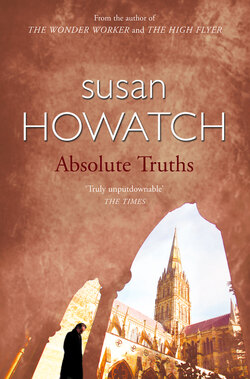Читать книгу Absolute Truths - Susan Howatch - Страница 49
VII
ОглавлениеFew bishops could have claimed to be a more loyal supporter of the monks and nuns in Anglican orders than I was, but it is a fact of life that parents want their children to marry and procreate. This is obviously such a deep-rooted human desire that one might call it a biological absolute truth, and it explains the surge of disappointment felt by parents when for whatever reasons their children abstain from marriage. I know there are Roman Catholic cultures where parents consider it an honour if their child chooses a celibate life, but I have noticed that the child is usually one of a large family and can be spared without too great a sense of loss. I did not have a large family of children. I had two sons and I wanted neither of them to be cut off from the complex dimensions of human fulfilment which I had experienced as a husband and father.
Indeed the fact that Charley was my adopted son only made me more anxious that he should wind up a married man with two-point-three children – or whatever current statistics rated the norm for a middle-class Englishman in the mid-twentieth century. If he deviated from this norm I knew I would feel that despite all my efforts I had failed to bring him up properly – and I did not want to think I had failed in any way with Charley. I needed Charley to be a success. It justified all the hardship I had endured in the early years of my marriage. Like his hero-worship of me, his success was part of my reward.
Telling myself that this new crisis was merely a manifestation of his continuing immaturity, I fought back my panic and toiled to appear mildly surprised. I said: ‘Isn’t this a trifle sudden?’
‘Yes, but it’s abundantly clear to me now that I’ve no hope of serving God properly unless I’m in an all-male environment and soaking myself in asceticism.’ Apparently unconscious of any irony he took a most un ascetic mouthful of hot buttered crumpet.
Still immaculately courteous I enquired: ‘But what’s driven you to abandon all hope of marriage?’
‘The realisation that I’m desperately in love with a married woman who finds me repulsive.’
‘You mean –’
‘Yes. I’m besotted with Venetia,’ said Charley, again referring to the young woman who had been Lyle’s protégée. ‘I think of her constantly. I dream of her. I toss and turn in bed every night until I’m drenched in sweat –’
Much relieved to receive this new evidence that Charley was sexually normal I said dryly: ‘How very inconvenient.’
‘Inconvenient! Dad, I can’t tell you – words fail me – it’s impossible for me even to begin to describe the quality of my erections –’
‘Dear me.’
‘– and they always come at exactly the wrong moment! Never in all my life have I experienced such –’
‘I’m sure they’re most remarkable. But Charley, I suspect the real question here is not why you should have fallen in love with Venetia but why you should always be falling in love with women who are unavailable for marriage. After all, Venetia isn’t the first of these hopeless passions of yours, is she? There was the married lady-dentist when you were up at Cambridge – and then there was that nun who gave those lectures on the mystics –’
‘Those were just adolescent infatuations. This is the real thing – and what slays me, Dad, is that I could have married her when she was single back in 1963! If only –’
‘You weren’t sufficiently interested or you’d have done something about it. Obviously it wasn’t meant that you and Venetia should marry.’
‘Well, I couldn’t possibly marry anyone else, and since all women are now a torment, reminding me of what I can’t have, what other choice do I have but to become a monk as soon as possible?’
‘If you’re called to be a monk I’ll eat my mitre, but don’t listen to me, I’m just a married bishop. I’ll ask Jon if he’d be willing to see you.’
Charley groaned and sighed and bit deep into his second crumpet, but this suggestion seemed to satisfy him and I realised he was much happier now that he had acted out his feelings in such an exasperatingly self-indulgent manner. I felt wrecked, of course, but I had long since discovered that feeling wrecked was an occupational hazard of parenthood, nothing to get excited about. I assumed I would eventually recover.
I was still trying to calm myself by predicting my inevitable recovery when Charley said in a low voice: ‘If I don’t go into a monastery I might wind up making a mess of my private life,’ and I heard at last the genuine cry for help which in my distress I had failed to recognise earlier.
At once I said: ‘Of course you won’t make a mess of your private life! I’ve brought you up, you’ve modelled yourself on me, you’re going to be fine.’
Charley looked relieved, as if I had recited a magic incantation guaranteed to keep all disastrous futures at bay, but I was aware that a shadowy uncertainty was trying to rise from some burial-ground deep in my mind. I could not analyse this uncertainty. It merely hovered for a second in my consciousness before I blotted it out.
Pouring myself some more tea, I began to calculate which train I could catch from Waterloo.
